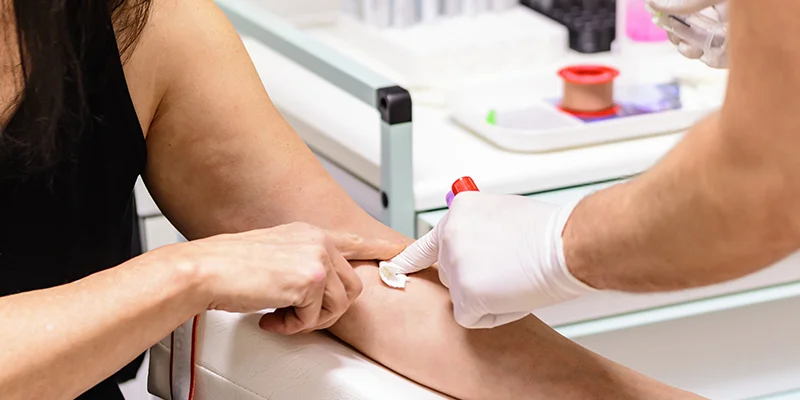What do Common Blood Investigative Tests Mean and How to Get Them?
Anyone who had a blood test must have experienced one of the many common blood investigations. This article will examine some of the most common blood investigations and what they can tell health professionals about a patient’s condition.
Overview of the Investigative Blood Tests
Blood investigative tests are a group of tests used to detect, diagnose, and monitor various conditions. They are performed by taking a sample of blood and then testing it for infection, inflammation, allergies, or the presence of specific hormones or other substances in the blood.
Blood investigative tests can detect conditions such as anaemia, infection, clotting disorders, cancer, heart disease, diabetes, inherited or chromosomal conditions, and liver and kidney function.
About the Investigative Blood Tests
An investigative blood test aims to provide information about a person’s health.
There are many types of blood tests, and the specific tests ordered will depend on the individual’s symptoms and medical history.
The most common blood tests include:
- Complete blood count (CBC) is a test to measure the different types of cells in the blood, as well as the levels of haemoglobin (the protein that carries oxygen) and platelets (cells that help with blood clotting).
- The basic metabolic Panel (BMP) checks the levels of the various components in the blood. Abnormal findings indicate diabetes, kidney disease, or hormonal imbalance in the body.
- Lipid Profile checks both good and bad Blood Cholesterol levels.
- Glucose
- Calcium
- Sodium
- Potassium
- Chloride
- Bicarbonate
- Creatinine
- Blood Urea Nitrogen
- Comprehensive Metabolic Panel (CMP) includes taking measurements of protein, albumin, bilirubin, and enzymes to check the function of the liver.
- Coagulation Test access the blood clotting time of the patient. It helps diagnose haemophilia, leukaemia, thrombosis, and vitamin K deficiency.
- A Chemistry Panel tests are a group of tests to measure the levels of certain chemicals in the blood, including glucose, electrolytes, and enzymes.
- Blood Glucose Test to check blood sugar levels with fasting or without fasting.
- Karyotyping (chromosome testing) for a genetic disorder.
- Erythrocyte Sedimentation Rate Test (ESR) for arthritis and inflammatory conditions.
- Cardiac Biomarkers for Heart Disease Risk
- Thyroid Function Test
- Sexually Transmitted Infection Tests for HIV, syphilis, herpes, gonorrhea, and chlamydia.
- C-reactive Protein Test to detect any bacterial or viral infection, an autoimmune condition, inflammation, or cancer.
Risk factors associated with Blood Investigative Tests
There are several risk factors associated with blood investigative tests, including infection, bleeding, and bruising. Despite these risks, blood investigative tests are generally safe. The vast majority of people who undergo these tests do not experience any complications. However, it is important to be aware of the potential risks before having any blood tests done.
Preparing for the Blood Investigative Tests
Preparing for blood investigative tests is important because it helps doctors get accurate results. So, the best is to follow the instructions to prepare for the tests.
Few tests require fasting for at least 12 hours before the test.
Avoid strenuous activity before the test.
Have someone with you to drive you home after the test.
What to expect from the Blood Investigative Tests
Mostly the blood tests are performed on an outpatient basis and take only a few minutes to complete.
The blood tests usually involve taking a small sample of blood from a vein in the arm. The blood sample is then sent to a laboratory for analysis. The results of the blood tests are usually available within a few days.
Possible results of the Blood Tests
One potential result of blood investigative tests is that they could come back completely normal. If all the test results are within the reference ranges, then this is usually a good sign that there is nothing wrong with the health of a patient. However, it is still important to continue to monitor the symptoms and see the doctor for regular check-ups, just to be safe.
Another potential result is that the tests may come back abnormal. If any of the test results fall outside of the reference ranges, this could indicate a potential health concern. In this case, the doctor will likely order additional tests. Results might take 24 to 72 hours to come.
Conclusion
The best time to have a blood test done is when a person is feeling well for a routine check-up, as well as when recommended by the doctor. If there is a history of health problems, it’s important to get a blood test done regularly. The only exception is if a person has symptoms of a disease that may be diagnosed by a blood test. For example, in case of tiredness, fever, or generally not feeling well, then it might be worth seeing a doctor and having some blood tests done.
FAQs
What are the main blood tests?
Common blood tests are CBC, BMP, CMP, Lipid profile, Coagulation Panel, Cardiac Biomarkers, Blood Glucose Test, and Thyroid panel.
What blood tests should be done annually?
The blood test to be done annually are CBC, BMP, CMP, Thyroid test, and test for the presence of essential nutrients in the blood like vitamin D, vitamin B12, Iron, magnesium, etc.
What cancers can be detected with a blood test?
Blood tests can detect blood cancers such as Leukaemia, Multiple myeloma, Hodgkin lymphoma, and non-Hodgkin lymphoma.

